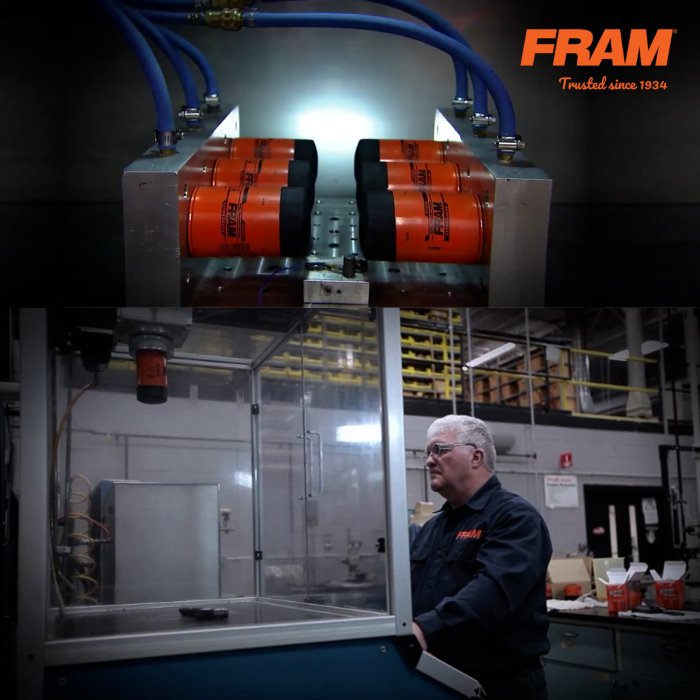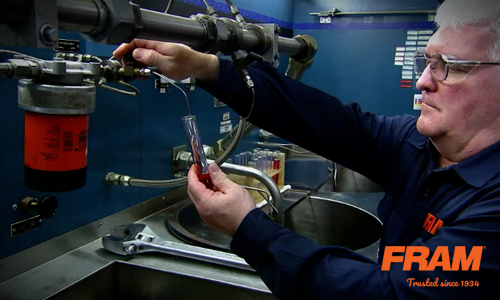
Product testing and analysis forms an integral part of FRAM’s quality management system that underpins the performance of each and every FRAM Filter product. The company’s sophisticated multi-million-dollar test machines and rigs are sourced from Europe, Asia and North America. These are commissioned by FRAM engineers to provide advanced testing capabilities that meet and exceed international standards.
It is far from a re-badging process for the FRAM Filters range of premium quality automotive aftermarket products.
FRAM ensures that:
FRAM also extensively tests their range against the various International Standards Organization (ISO) and vehicle manufacturer performance standards which include testing for separation efficiency, dirt holding capacity and resistance to fluid flow.
FRAM Filters surpass the following ISO manufacturing standards:
ISO 2949 Element integrity
ISO 4548-12 Filtration efficiency
ISO 19438 Filtration efficiency
ISO 4548-4 Hydrostatic burst pressure
ISO 4020 Pressure impulse fatigue
ISO 4548-5 Hydraulic pulse durability
ISO 4548-9 Inlet and Outlet anti-drain back valve
ISO 4548-2 Element by-pass valve characteristics
ISO 4548-1 Resistance to flow
ISO 5011 Dust holding capacity and efficiency
FRAM Filter products also undergo rigorous testing in simulated engine operating conditions to ensure product integrity and performance capabilities meet vehicle manufacturer recommended service intervals.

Element Bubble Test (ISO 2949) – All filters
The element bubble test is a measurement of the filter element’s integrity. It tests that the filter media is not damaged, that there is sufficient adhesive in the end caps and that the filter media joins are correct. In addition, this is a quality check to ensure that the element has been manufactured with the correct grade of filter media.
When performing the element bubble test, one side of the filter element is pressurised with air while being submerged in a test liquid until the first bubble is released through the element. The corresponding air pressure is then verified with the relevant specification.
Filtration efficiency (ISO 4548-12 and ISO 19438) – Oil and Fuel filters
This test simulates extreme engine operating conditions, such as those required for high performance and competition engines. It determines the filter’s capacity and efficiency at removing contaminants from the oil or fuel.
Air Cleaner Restriction / Pressure Drop, Dust Holding Capacity & Efficiency (ISO 5011) – Air Filters
Air borne contaminants such as soot and dust are harmful to the combustion process, without adequate protection the air flow sensor can be blocked causing havoc to the engine management system. Of course, dust entering the engine will damage the pistons, rings and liners. A blocked air filter affects the service interval of the filter and also has a considerable impact on engine fuel consumption.
This test assesses the overall performance of an air filter to establish its efficiency and filter element dust holding capacity.
According to Roger Lassen, Filpro Automotive Managing Director - Australasia, “The dedication to constant testing, research and product development is pivotal to the long-term success that the FRAM Filters brand has gained globally over several decades both in the Original Equipment and automotive aftermarket sectors.”
“As is always comprehensively proven to be true, nothing transcends quality. The only way to ensure product integrity and quality is to constantly engage in testing and development in line with the advances made with automotive vehicle engine technology and performance demands. This is particularly important when it comes to filtration.
“When you select FRAM Filters for your customers’ cars, you are selecting world class replacement filtration products that are at the absolute leading edge of innovation, technology, testing and development,” Mr Lassen concluded.
FRAM Filters are available across Australia to find your nearest distributor visit https://framfilters.com.au/where-to-buy/
This article is brought to you by FRAM